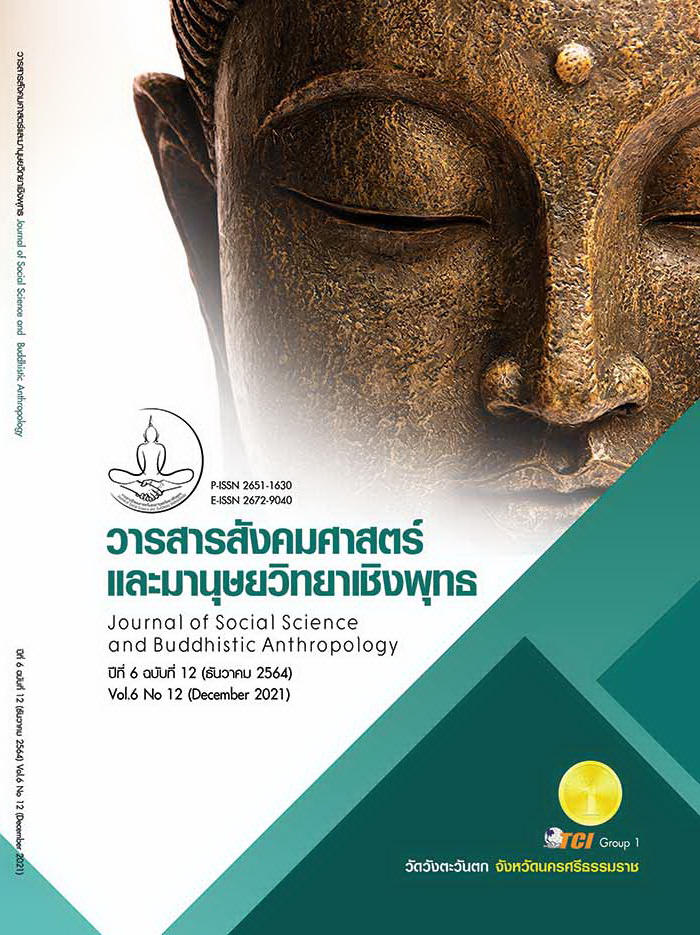FACTORS INFLUENCING SELF - CARE PREVENTION BEHAVIORS AND SOCIETY OF CORONAVIRUS DISEASE 2019 AMONG VILLAGE HEALTH VOLUNTEER PERFORMANCE (VHV) IN NAKHON SI THAMMARAT PROVINCE
Keywords:
Self - Care Prevention Behaviors and Society, Coronavirus Disease 2019, Village Health Volunteer Performance (VHV)Abstract
The objectives of this research article were to access behavior for protecting Coronavirus disease 2019. Moreover, the study was to determine factors influencing self - care prevention behaviors and society of Coronavirus disease 2019 among village health volunteer performance (VHV), Nakhon Si Thammarat Province. The cross - sectional survey research was conducted on 407 village health volunteer performance (VHV). The data were collected by using the questionnaires which showed Cronbach alpha coefficient of perception Coronavirus disease 2019 equal to 0.87 and 0.76 of self - care prevention behaviors and society of Coronavirus disease 2019 among village health volunteer performance (VHV), data were analyzed by using stepwise regression.Study results revealed that the majority of village health volunteer performance (VHV) perception of Coronavirus disease 2019 showed the high level of 96.6 percent and high level of benefit perception ( = 2.93, S.D. = 0.21). Self - care prevention behaviors and society of Coronavirus disease 2019 among village health volunteer performance (VHV) showed the high level of 72 percent. Analysis of the factors that affect self - care prevention behaviors and society (Y) showed that the factors most are : perceived benefits of disease(X1), prevention perceived susceptibility(X2) and level education (X3) about predicts with self - care prevention behaviors and society of Coronavirus disease 2019. Follow the equation was Y = -.669+0.813(X1) +0.291(X2)+0.075(X3). These factors combined can predict self - care prevention behaviors and society of Coronavirus disease 2019 among village health volunteer performance (VHV) 13.90 percent.
References
กรมควบคุมโรค กระทรวงสาธารณสุข. (2564). รายงานสถานการณ์ COVID - 19. เรียกใช้เมื่อ 22 มิถุนายน 2564 จาก https://ddc.moph.go.th/viralpneumonia/
กรมสนับสนุนบริการสุขภาพ กระทรวงสาธารณสุข. (2563). คู่มือแนะนำสำหรับ อสม. เรียกใช้เมื่อ 26 ธันวาคม 2563 จาก https://resourcecenter.thaihealth.or.th/interesting-issues/article
จิตรา มูลทิ. (2564). ปัจจัยที่มีอิทธิพลต่อพฤติกรรมการป้องกันโรคติดเชื้อไวรัสโคโรนา 2019 ของอาสาสมัครสาธารณสุขประจำหมู่บ้านอําเภอกงไกรลาศจังหวัดสุโขทัย. วารสารวิชาการ สคร, 27(2), 5-14.
ธวัชชัย ยืนยาว และเพ็ญนภา บุญเสริม. (2563). ความสัมพันธ์ระหว่างความรู้ ทัศนคติ ต่อพฤติกรรมการป้องกันการติดเชื้อไวรัสโคโรนา 2019. วารสารการแพทย์ ศรีสะเกษ สุรินทร์ บุรีรัมย์, 35(3), 555-564.
ประกาศกระทรวงสาธารณสุข ฉบับที่ 3. (2563). เรื่อง ชื่อและอาการสำคัญของโรคติดต่ออันตราย. ราชกิจจานุเบกษา เล่ม 137 ตอนพิเศษ 48 ง หน้า 1 (29 กุมภาพันธ์ 2563).
วิญญ์ทัญญู บุญทัน และคณะ. (2563). ปัจจัยที่มีอิทธิพลต่อพฤติกรรมการสร้างเสริมสุขภาพในการป้องกันการติดเชื้อไวรัสโคโรนา 2019 (โควิด 19) ของผู้สูงอายุ. วารสารพยาบาลตำรวจ, 12(2), 323-337.
ศูนย์บริหารสถานการณ์แพร่ระบาดของโรคติดเชื้อไวรัสโคโรนา. (2019). หนังสือสั่งการ (มท.). เรียกใช้เมื่อ 1 พฤษภาคม 2564 จาก https://www.moicovid.com/หนังสือสั่งการ/
สำนักข่าว อสมท.นครศรีธรรมราช. (2021). อสม.เศร้า!อสม.เมืองคอนติดโควิด2วันเสียชีวิต. เรียกใช้เมื่อ 1 พฤษภาคม 2564 จาก https://www.innnews.co.th/news/local/news_93751/
สำนักงานกองทุนสนับสนุนการสร้างเสริมสุขภาพ (สสส.). (2563). คู่มือแนะนำสำหรับ อสม. ในการเคาะประตูเยี่ยมบ้านเพื่อสังเกตอาการโควิด - 19. เรียกใช้เมื่อ 1 ธันวาคม 2563 จาก https://resourcecenter.thaihealth.or.th/article
Becker, M. H. & Maiman, L. A. (1975). The Health Belief Model: Origins and Correlation in Psychological Theory. Health Education Monography, 2(Winter), 336-385.
Becker, M. H. et al. (1977). The Health Belief Model and Prediction of dietary Compliance : A field Experiment. Journal of Health and Social Behavior, 18(4), 348-366.
Best, J. W. (1981). Research in Education. (4th ed.). New Jersey: Prentice - Hall Inc.
. (1993). Research in Education. Boston, M.A.: Allyn and Bacon.
Cronbach, L. J. (1970). Essentials of Psychological Test. (5th ed.). New York: Harper Collins.
Hfocus.org. (2564). เจาะลึกระบบสุขภาพ. เรียกใช้เมื่อ 25 มิถุนายน 2564 จาก https://www.hfocus.org/content/2021/0
Hussein, N. R. et al. (2020). Assessment of knowledge, attitudes, and practices toward COVID - 19 virus among university students in Kurdistan region, Iraq: Online cross - sectional study. Journal of Family Medicine and Primary Care, 9(9), 4809-4814.
Krejcie, R. V. & Morgan, D. W. (1970). Determining Sample Size for Research Activities. Educational and Psychological Measurement, 30(3), 607-610.
Marion, d. V. et al. (2020). Dynamic Public Perceptions of the Coronavirus Disease Crisis, the Netherlands. Emerging Infection Diseases Journal, 27(4), 1098-1109.
Ministry of Public Health. (2020). Coronavirus Situation. Retrieved January 15, 2021, from https://www.bbc.com/thai/thailand-51089461
Pouresmali, A. et al. (2021). Self - Care Behavior Prevention of Covid - 19 in the General Population Based on Pender Health Promotion Model. Retrieved January 15, 2021, from https://www.researchsquare.com/article/rs-139049/v1
Shichang, D. et al. (2020). Perceived Severity of COVID - 19 and Post - pandemic Consumption Willingness: The Roles of Boredom and Sensation - Seeking. Retrieved January 15, 2021, from https://doi.org/10.3389/fpsyg.2020.567784
World Health Organization. (2021). WHO Coronavirus Disease (COVID - 19). Retrieved June 22, 2021, from http://covid19.who.int/
Yogi, T. P. et al. (2020). Factors affecting perceived effectiveness of COVID - 19 prevention measures among Filipinos during Enhanced Community Quarantine in Luzon, Philippines: Integrating Protection Motivation Theory and extended Theory of Planned Behavior. International Journal of Infectious Diseases, 99(2020), 312-323.
Yunjuan, L. et al. (2021). The Moderating Effects of Perceived Severity on the Generational Gap in Preventive Behaviors during the COVID - 19 Pandemic in the U.S. International Journal of Environment Research and Public Health, 18(2011), 2-12.
Zhong, B. L. et al. (2020). Knowledge, attitudes, and practices towards COVID - 19 among Chinese residents during the rapid rise period of the COVID - 19 outbreak: A quick online cross - sectional survey. International Journal of Biological Sciences, 16(10), 1745-1752.
Downloads
Published
How to Cite
Issue
Section
License
Copyright (c) 2021 Journal of Social Science and Buddhistic Anthropology

This work is licensed under a Creative Commons Attribution-NonCommercial-NoDerivatives 4.0 International License.









